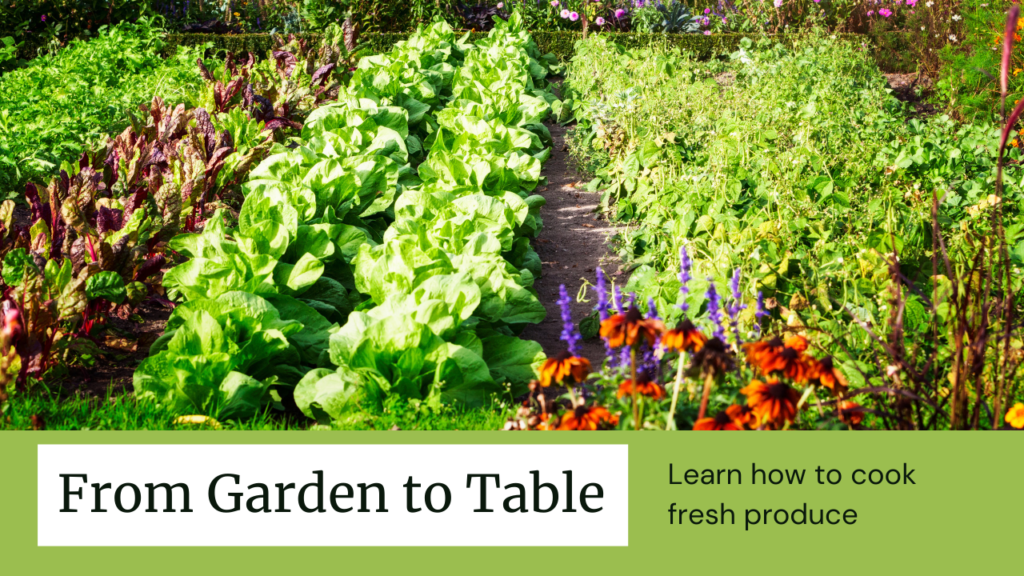From Garden to Table: The Importance of Harvesting Fresh and Organic Food at Home
In a world dominated by processed foods and busy schedules, the value of harvesting fresh and organic food from your own garden cannot be overstated. Beyond the pleasure of cultivating your own sustenance, this practice offers a range of benefits for your health, the environment, and your overall well-being. In this article, we’ll delve into the reasons why “From Garden to Table” should become an integral part of your lifestyle.
1. Nutrient-Rich Delights: When you harvest food from your garden and consume it immediately, you’re enjoying produce at the peak of its nutritional value. Unlike store-bought fruits and vegetables that often travel long distances and spend time in storage, freshly harvested crops are packed with vitamins, minerals, and antioxidants that contribute to your overall health and vitality. This direct access to nutrients supports your immune system, energy levels, and overall well-being.
2. Flavor Beyond Compare: The difference in taste between store-bought produce and garden-fresh delights is remarkable. Homegrown vegetables and fruits burst with flavor that can’t be replicated in commercial settings. The freshness of your harvest translates into enhanced taste experiences, making your meals more enjoyable and satisfying. From the crispness of a just-picked apple to the vibrant sweetness of a sun-ripened tomato, your taste buds will revel in the flavors of your garden.

3. Environmental Impact: The journey from farm to supermarket involves transportation, packaging, and storage, all of which contribute to the carbon footprint of your food. By growing your own produce, you significantly reduce the environmental impact associated with the industrial food chain. You’ll also decrease the demand for conventional agriculture, which often relies on synthetic pesticides and fertilizers that can harm the environment. Embracing a “From Garden to Table” approach is a step toward sustainable living and reducing your ecological footprint.
4. Control Over Chemicals: When you cultivate your garden using organic practices, you have full control over what goes into your food. Unlike conventionally grown produce, which might be exposed to chemical pesticides and synthetic fertilizers, your homegrown crops are free from these harmful substances. This means you’re protecting yourself and your loved ones from potential health risks associated with consuming chemical residues often found in store-bought produce.
5. Connection with Nature: Engaging in gardening connects you with the natural world in a profound way. It offers an opportunity to witness the miracle of growth and the rhythms of the seasons up close. Tending to plants, nurturing soil, and observing the lifecycle of your crops fosters a deeper appreciation for nature’s cycles and the interconnectedness of all living things. This connection can be incredibly fulfilling and soothing for the soul.

6. Budget-Friendly: Growing your own food can also have positive economic implications. While there’s an initial investment in tools, seeds, and soil amendments, the long-term savings can be substantial. You’ll find yourself spending less on groceries and enjoying the satisfaction of knowing that your efforts are contributing to your household’s food security.
7. Educational Value: Gardening offers a hands-on learning experience that can be valuable for individuals of all ages. Children, in particular, can benefit from understanding where their food comes from and witnessing the process of growth firsthand. Gardening fosters curiosity, responsibility, and an appreciation for the natural world, which are essential life skills.
8. Stress Reduction: Spending time in a garden, surrounded by the beauty of nature, has been shown to have positive effects on mental health. Gardening can reduce stress levels, lower blood pressure, and promote relaxation. Engaging in gardening activities, such as planting, weeding, and harvesting, can serve as a therapeutic escape from the demands of daily life.
9. Sense of Accomplishment: Successfully nurturing a garden and enjoying its bounty provides a genuine sense of accomplishment. Witnessing the growth of plants from tiny seeds to flourishing crops instills a feeling of pride and achievement. This tangible result of your efforts can boost your self-esteem and overall sense of well-being.
10. Community Building: Sharing your garden-fresh produce with friends, family, and neighbors can foster a sense of community. It encourages social interactions, conversations about gardening tips, and the joy of gifting your harvest to those around you. Community gardens and local farmer’s markets also provide avenues for connecting with like-minded individuals who appreciate the value of fresh and organic food.
In conclusion, the journey from garden to table is not just about satisfying your hunger; it’s a holistic approach to nourishing your body, mind, and soul. Harvesting fresh and organic food from your own garden offers an array of benefits that extend beyond the plate, encompassing health, sustainability, connection, and personal fulfillment. By embracing this practice, you’re not only cultivating delicious produce but also nurturing a healthier, happier lifestyle for yourself and those you care about.
I would leave you with these thoughts. Would request you all to read about how kids are to be engaged during tough times. Read more on relationship and lifestyle tags.
Keep Smiling & Be Graced!!


Facebook | Instagram | YouTube | Goodreads | Artwork | Books | Journals – Diaries – Notebooks | Author Central Page | LinkedIn
For collaboration, workshops and to come as a guest at my podcast please hit an email – spiritedblogger707@gmail.com
